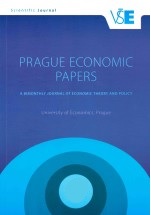Fiscal stimulus on Bayesian DSGE models
Fiscal stimulus on Bayesian DSGE models
Author(s): Kuo-Hsuan ChinSubject(s): Social Sciences, Economy, National Economy
Published by: Vysoká škola ekonomická v Praze
Keywords: Bayesian approach; Bayesian model averaging; government spending multipliers
Summary/Abstract: I take a Bayesian approach to estimate and forecast the effects of fiscal stimulus in various versions of the model by Smets and Wouters (2007) for the US economy. Specifically, I proxy various simpler DSGE sub-models by imposing a tight prior on a single parameter or a combination of tight priors on multiple parameters in the Smets-Wouters model. I find that the present-value government spending multipliers obtained are all in a reasonable range. Moreover, I forecast the effect of fiscal stimulus in a scenario similar to the 2008/2009 recession in the US, where the public expects a large and temporary increase in government spending to stimulate a fragile economy. The forecasts, generated individually by a group of representative models, are weighted averaging by means of the posterior model probabilities that are computed on the basis of their corresponding marginal data densities. According to the Diebold-Mariano test, I find that the forecast error of the combination forecast, computed via Bayesian model averaging (BMA), is statistically larger than the individual forecast, obtained only from the one that has the best fit among those DSGE models.
Journal: Prague Economic Papers
- Issue Year: 28/2019
- Issue No: 6
- Page Range: 688-708
- Page Count: 21
- Language: English

